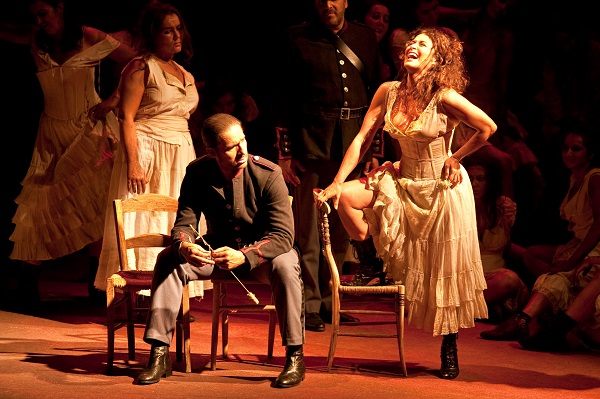Carmen Suites (Bizet/Guiraud) on:
[Wikipedia]
[Google]
[Amazon]
The ''Carmen Suites'' are two suites of orchestral music drawn from the music of Georges Bizet's 1875 opera '' Carmen'' and compiled posthumously by his friend 

Ernest Guiraud
Ernest is a given name derived from Germanic word ''ernst'', meaning "serious". Notable people and fictional characters with the name include:
People
*Archduke Ernest of Austria (1553–1595), son of Maximilian II, Holy Roman Emperor
*Ernest, M ...
. They adhere very closely to Bizet's orchestration. However the order of the musical allusions are in reversed chronological order, and do not adhere to the operatic versions entirely, although the Suite is directly inspired by Bizet's opera.
Guiraud also wrote the recitative
Recitative (, also known by its Italian name "''recitativo''" ()) is a style of delivery (much used in operas, oratorios, and cantatas) in which a singer is allowed to adopt the rhythms and delivery of ordinary speech. Recitative does not repeat ...
s for ''Carmen'', and compiled the second of the two suites from Bizet's '' L'Arlésienne'' incidental music.
Each of the ''Carmen Suites'' contains six numbers. Both suites have been performed and recorded many times.

Carmen Suite No. 1
* Prélude – Act I, prelude (fate motive) * Aragonaise – Interlude (entr'acte
(or ', ;Since 1932–35 the French Academy recommends this spelling, with no apostrophe, so historical, ceremonial and traditional uses (such as the 1924 René Clair film title) are still spelled ''Entr'acte''. German: ' and ', Italian: ''inte ...
) before act 4
* Intermezzo – Interlude (entr'acte) before act 3
* Séguedille – Act 1, Carmen: "Près des remparts de Séville"
* Les Dragons d'Alcala – Interlude (entr'acte) before act 2
* Les Toréadors – Theme from prelude to act 1 and Procession of the Toreadors from act 4: "Les voici! voici la quadrille des Toreros!".
Suite No. 1 was published c. 1882.
The Aragonaise was also used by Pablo de Sarasate in his '' Carmen Fantasy'' for violin and orchestra and by Franz Waxman
Franz Waxman (né Wachsmann; December 24, 1906February 24, 1967) was a German-born composer and conductor of Jewish descent, known primarily for his work in the film music genre. His film scores include ''Bride of Frankenstein'', ''Rebecca'', ' ...
in his own '' Carmen Fantasie''.

Carmen Suite No. 2
* Marche des Contrebandiers – Act 3, chorus: "Écoute, écoute, compagnon!" * Habanera: Act 1, aria (Carmen) – "L'amour est un oiseau rebelle
Habanera (" usic or danceof Havana") is the popular name for "" (; "Love is a rebellious bird"), an aria from Georges Bizet's 1875 opéra comique '' Carmen''. It is the entrance aria of the title character, a mezzo-soprano role, in scene 5 o ...
"
* Nocturne: Act 3, aria (Micaëla) – "Je dis que rien ne m'épouvante"
* Chanson du Toréador – Act 2, introduction and aria (Escamillo): " Votre toast, je peux vous le rendre"
* La Garde Montante – Act 1: "Avec la garde montante, nous arrivons, nous voilà!"
* Chanson Bohème – Act 2, Gypsy Dance: "Les tringles des sistres tintaient"
Suite No. 2 is longer than the first suite. It was published in 1887.
References
External links
* * {{DEFAULTSORT:Carmen Suites (Bizet Guiraud) Orchestral suites 1882 compositions 1887 compositions Compositions by Georges Bizet Compositions for symphony orchestra Arrangements of classical compositions